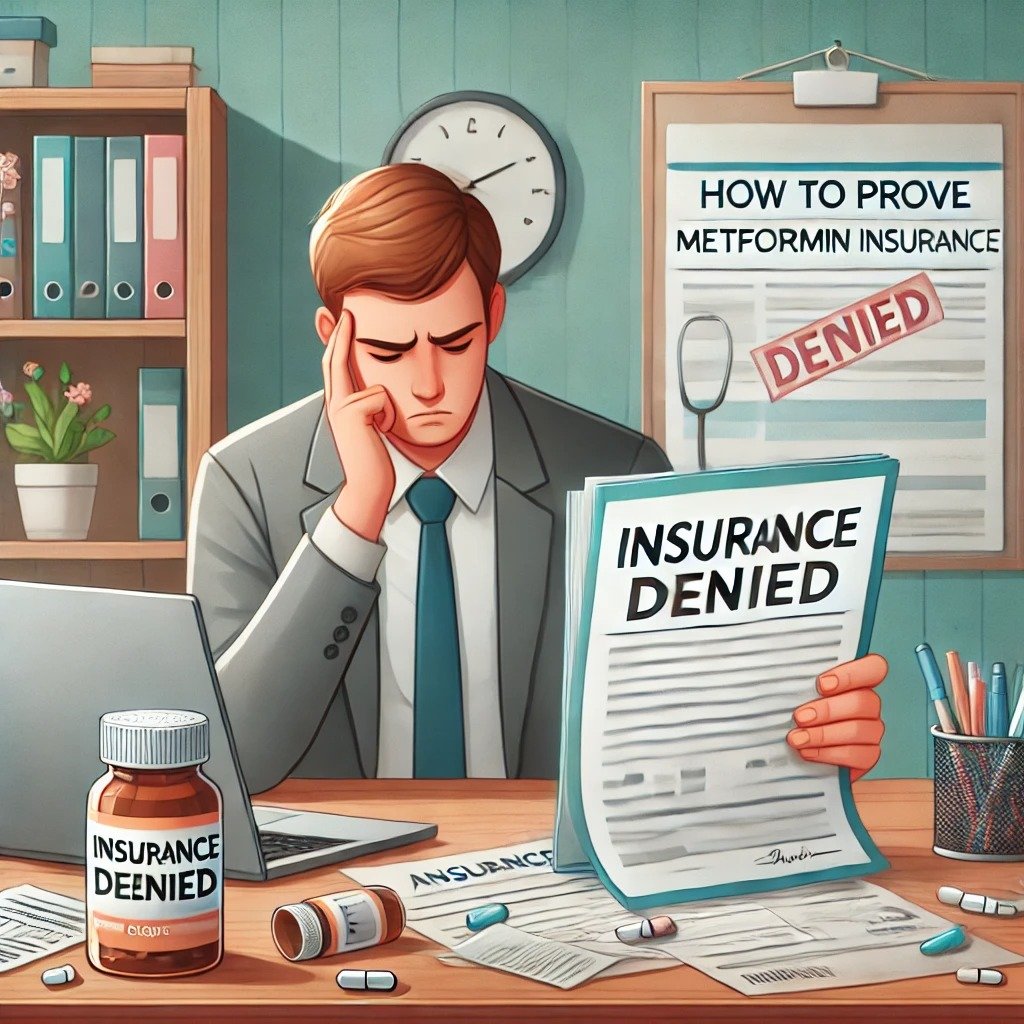Failed Metformin insurance is a dissolution test. When prescribed metformin, many people hope it will help manage their diabetes effectively. However, metformin doesn’t work for everyone. If you experience side effects or find it ineffective, you may want to try alternative treatments. Convincing your insurance provider to cover another medication can be challenging, especially if metformin is considered the first-line treatment. Here’s a complete guide to help you prove to your insurance that metformin failed and get the support you need for an alternative option.

Criteria of failed Metformin insurance
To persuade your insurance company, it’s crucial to understand what constitutes “treatment failure.” For most cases failed Metformin insurance means:
No improvement in blood sugar control after an adequate trial period.
Significant side effects that interfere with your daily life.
Documented reasons from a healthcare provider why metformin isn’t suitable for you.
Meeting one or more of these criteria can build a solid case for insurance coverage for another medication.
Documenting Symptoms and Side Effects
To prove metformin didn’t work, you’ll need detailed records of any issues you encountered. Here’s how:
Track your symptoms: Document every side effect, from digestive issues to fatigue or dizziness. Note when they started, their severity, and how long they lasted.
Record your blood sugar readings: If your blood sugar levels haven’t improved or have worsened, track these numbers carefully.
Daily journal entries: Write down how metformin affects your daily activities. If it causes gastrointestinal issues or lethargy that disrupts your life, include these in your journal.
Tips to prove failed Metformin insurance
Ask your doctor for a treatment diary template to record everything systematically.
Consult with Your Doctor for Supportive Evidence
Your doctor’s support can make a significant difference. Here’s what you can ask for:
Medical documentation: Request that your doctor records all instances of side effects and lack of improvement in your medical file.
Alternative treatment recommendations: Ask your doctor to suggest alternative medications in your record. Insurers are more likely to consider these suggestions seriously if they come from a healthcare provider.
Submit a Prior Authorization Request
A Prior Authorization (PA) request is required for many non-generic medications. Here’s how to get one:
Check your insurance’s requirements for PA. These can vary between companies.
Complete the required forms with your doctor’s help. Be as detailed as possible about metformin’s lack of effectiveness and its side effects.
Include supportive evidence, like blood sugar logs, doctor notes, and any additional lab results.
This step helps show that you and your healthcare provider are serious about managing your health with the best treatment available.
Preparing a Letter of Medical Necessity
A Letter of Medical Necessity can strengthen your request. Here’s what it should contain:
Detailed reasoning: Explain why metformin failed. Highlight side effects, lack of blood sugar control, and your doctor’s recommendations.
Suggested alternative: Include why a different medication is medically necessary.
Supporting documents: Attach blood sugar records, symptom logs, and any relevant lab work.
Ask your doctor to write or sign off on the letter to give it greater legitimacy.
Filing an Appeal if Insurance Denies Coverage
If your failed Metformin insurance denies coverage for alternative treatment, don’t give up. You have the right to appeal. Here’s a step-by-step guide:
Gather additional documentation: If you didn’t submit enough evidence before, gather more records of metformin’s failure.
Contact your insurance’s appeals department: Explain your case briefly and ask about the appeals process.
File the appeal in writing: Most insurance companies require a written appeal. Include all supportive evidence and a new letter from your doctor, if possible.
Follow up: Contact the insurance company to ensure they received your appeal and are processing it.
Tips:
If you’re struggling with the appeal, consider a patient advocate. Many hospitals provide patient advocates who can assist with insurance disputes.
Other Important Documentation to Include
The more information you provide, the stronger your case. Here are a few additional documents that can help:
Medication log: Show the dates and times you took metformin, along with your blood sugar readings.
Emergency visits: Document any emergency room or urgent care visits related to metformin side effects.
Treatment history: Include past treatments for diabetes and any medications that have previously failed.
Alternatives to Metformin: A Look at Options
Understanding your options will also help your case. Here are some common alternatives to discuss with your doctor:
Sulfonylureas: These medications increase insulin production and can be effective for those who don’t respond well to metformin.
DPP-4 inhibitors: These medications help reduce blood sugar levels without causing as many digestive side effects as metformin.
GLP-1 receptor agonists: These may assist in both blood sugar control and weight management.
Frequently Asked Questions (FAQs)
How do I know if metformin isn’t working?
If you aren’t seeing improvement in your blood sugar levels or if you’re experiencing unbearable side effects, metformin might not be working effectively for you. Consult your doctor to discuss symptoms and alternative treatments.
What happens if my insurance denies my request for another medication?
You have the right to file an appeal. Provide additional documentation and support from your doctor to strengthen your case.
How long does it take to get insurance approval for an alternative to metformin?
The timeline can vary. Some approvals take days, while others may take several weeks, especially if an appeal is needed.
Can I change medications without my insurance’s approval?
You can switch to an alternative medication, but without insurance approval, you may have to cover the costs out-of-pocket.
Why do insurance companies require metformin first before covering other medications?
Metformin is a first-line treatment due to its affordability and effectiveness for many people. Insurers often require it before covering costlier alternatives.

